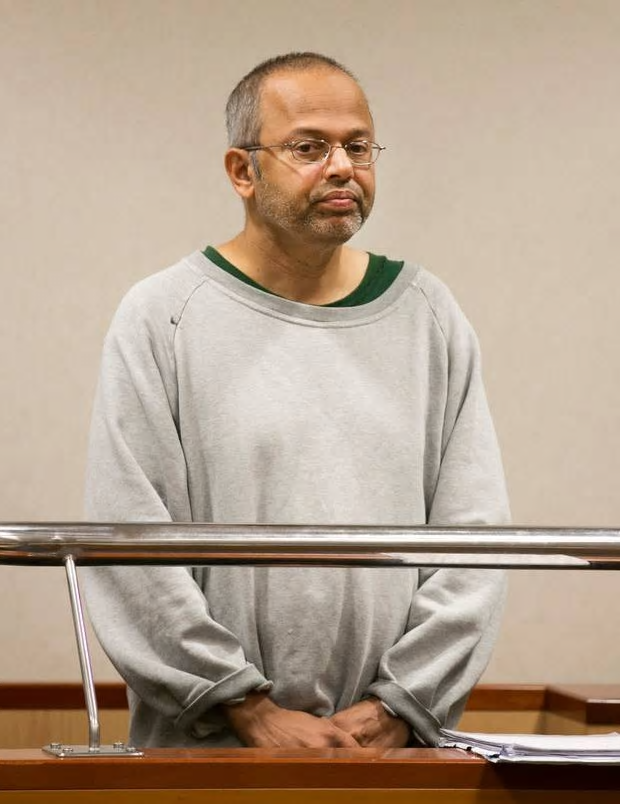 Mohammed Shakeel Siddiqui puported to have an American degree in psychiatry and neurology and was earning more than $165,000 a year. Photo / David Kerr
Mohammed Shakeel Siddiqui puported to have an American degree in psychiatry and neurology and was earning more than $165,000 a year. Photo / David Kerr
A man who masqueraded as an American-educated psychiatrist before working at one of New Zealand’s biggest hospitals, earning more than $165,000 per year, says he was qualified for the job.
Mohamed Shakeel Siddiqui, who was arrested in July 2015 with the help of the US Federal Bureau of Investigation (FBI), today challenged his convictions and sentence in the Court of Appeal.
He had earlier pleaded guilty to four charges of deception and forgery and was sentenced to four years and three months in prison after he conned his way into a job at Waikato Hospital in January 2015.
He has since been deported to his native India.
Throughout the case, Siddiqui has chopped and changed through several different lawyers and today was represented by David Allan.
Allan said Siddiqui gained a doctorate in engineering from the University of Arizona in 1992 and also obtained a medical degree in 2008.
He said Siddiqui’s claim of right was that he was appropriately qualified for the Waikato District Health Board role.
New Zealand Police investigations found Siddiqui is a qualified doctor but had dramatically lied about his specialist qualifications to acquire the job.
Previous trial counsel error and Siddiqui being overwhelmed by pressure from counsel, the court and judge led to premature guilty pleas, Allan said.
Crown Law argued Siddiqui’s convictions should not be overturned because his plea was entered voluntarily, he was properly informed by his counsel, and hasn’t identified any tenable defence to the charges.
Siddiqui earlier sought to vacate his pleas but the application was rejected by Judge Glen Marshall.
The court heard today the plea negotiation was Siddiqui’s idea before Judge Marshall later ruled he had entered his guilty pleas without undue pressure.
A further nine charges were withdrawn at Siddiqui’s sentencing.
The Court of Appeal judges, Justices Patricia Courtney, Graham Lang and Christian Whata, reserved their decision.
Court documents, earlier obtained by the Herald, show Siddiqui attempted to work in New Zealand in 2012 but was turned down by International Medical Recruitment (IMR) because of his lack of qualifications.
Two years later he tried again – this time with fake documentation – and was successful.
Siddiqui, who purported to be a psychiatrist, obtained an original copy of a degree in psychiatry and neurology from by the American Board of Psychiatry and Neurology (ABPN).
The qualification, however, had been awarded to another man with a similar name, Dr Mohammed Shafiuddin Siddiqui.
He is an assistant professor in psychiatry at Southern Illinois University of Medicine in Springfield, Illinois.
Because of Siddiqui’s lies he was paid a salary by the Waikato DHB of at least $165,000 after being granted a job on January 19, 2015.
During his five months in the job he also claimed expenses worth $4883.64, excluding relocation costs and flights.
He was also able to prescribe medication to mental health patients.

Court documents show Siddiqui provided three references with his CV, but investigations by the New Zealand Police and the FBI proved them to be fake.
None of the named referees worked at the hospitals named by Siddiqui, nor had he been employed by them either.
The Waikato DHB was given one oral reference by a Dr Mohan Nataraj, however, when double checked the phone number was associated with Siddiqui’s brother.
Because of the fraud, the ABPN has tightened its protocol about what information can be obtained from its website.
Siddiqui’s forged documents included a State of Illinois Department of Financial and Professional Regulation certificate licence and an ABPN certificate to obtain a NZ Medical Council vocational licence.
During the court case, Siddiqui was remanded in custody from December 2015 after he was arrested at Auckland International Airport seemingly trying to flee the country.
Despite earlier surrendering his passport to New Zealand authorities he was able to obtain a new passport and bought a one-way ticket to Houston.
At sentencing, Siddiqui told the court of the hardship his two children, who live in the United States, would face if he was deported back to India.
“I have no one to go back to in India,” he said.
“The system is designed to protect the family and that’s what I want to do. If I have a sentence of over two years the chances of me returning to the US are nil.”
Siddiqui has a permanent prohibition on returning to New Zealand and outcome of the appeal will also affect his ability to return to America.
Fake psychiatrist who forged US degree says he was qualified for Waikato Hospital job
